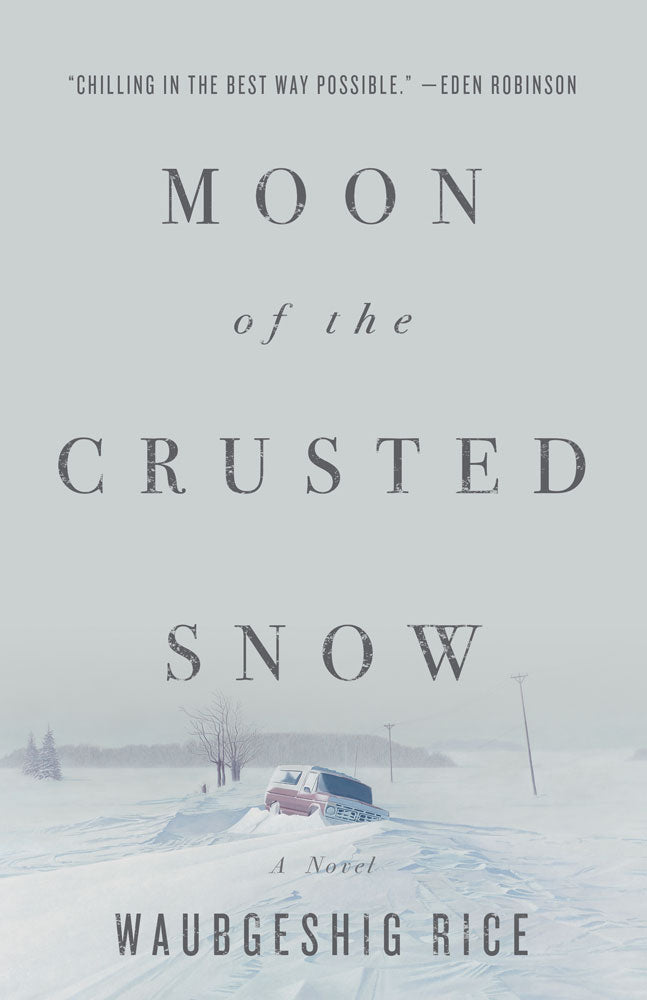
Evan Whitesky is dressing a moose when the power goes out in his small, remote Anishinaabe reserve. He and his wife Nicole joke about it when he returns - without TV, they might actually have to have a conversation!
At first no one in the community is particularly surprised or concerned by the outage; up until very recently, this was a frequent occurrence, and the town has diesel generators. But the power stays off, and the truck that supplies food and diesel doesn't arrive, and there's no word from anyone...
This small-scale apocalypse novel is a meditative study of the rhythms of a community, and what happens when those rhythms are disrupted. Its focus is more on the moment-to-moment how-to of dressing a deer and offering tobacco, keeping kids entertained without electricity, and holding community meetings with refreshments than on starvation and shootouts; the latter does happen, but it's understated and a small piece of the whole. Moon of the Crusted Snow has as much in common with other novels about the atmosphere of a particular community, like Rumer Godden's In This House of Brede, which is set in a nunnery, as it does with the average post-apocalypse novel.
A lot of post-apocalypse novels are about the violent disintegration of community, assuming that the moment there's no electricity, everyone will rush out to murder and rape with impunity. Leaving aside that even with electricity, people in privileged classes can already murder and rape with impunity, this assumes that murder and rape is what most men are only prevented from doing by a veneer of civilization; that exterior forces are the only thing holding communities back from utter chaos.
In Moon of the Crusted Snow, exterior forces aren't a wall of civilization holding back chaos, they're the brutal colonization that tried and tries its hardest to destroy the community.
Here an elder is talking about how the younger people have been saying it's the apocalypse and the end of the world.
“The world isn’t ending,” she went on. “Our world isn’t ending. It already ended. It ended when the Zhaagnaash came into our original home down south on that bay and took it from us. That was our world. When the Zhaagnaash cut down all the trees and fished all the fish and forced us out of there, that’s when our world ended. They made us come all the way up here. This is not our homeland! But we had to adapt and luckily we already knew how to hunt and live on the land. We learned to live here... But then they followed us up here and started taking our children away from us! That’s when our world ended again. And that wasn’t the last time. We’ve seen what this... what’s the word again?”
“Apocalypse.”
"Yes, apocalypse. We’ve had that over and over. But we always survived. We’re still here. And we’ll still be here, even if the power and the radios don’t come back on and we never see any white people ever again.”
Left to its own devices, the community doesn't suddenly revert to barbarity. Nor does it become a perfect haven. Instead, its strengths and weaknesses that were present before the disaster continue, brought into sharper emphasis: people care for each other and make sure everyone's fed, some try to become more self-sufficient while others take the food they're given and complain about it, news travels and stories are told, and they're still vulnerable to invaders.
This is one of those books that's immersive if you like it and stultifying if you don't. It has some very sad parts, but I didn't find it depressing. The apocalypse is never explained because the characters have no idea what happened, though we do eventually learn a bit more about what's going on elsewhere.
I was immersed in it from page one, and found it very moving. It feels like a standalone, but I read that a sequel is in the works. I definitely plan to read that.
From:
no subject
From:
no subject
Moon of the Crusted Snow is sad in parts and hopeful in parts. I didn't find it that depressing.
From:
no subject
From:
no subject
From:
no subject
From:
no subject
From:
no subject
From:
no subject
From:
no subject
From:
no subject
From:
no subject
From:
no subject
From:
no subject
From:
no subject
From:
no subject
From:
no subject
From:
no subject
From:
no subject
*makes a note*
From:
no subject
From:
no subject
From:
no subject